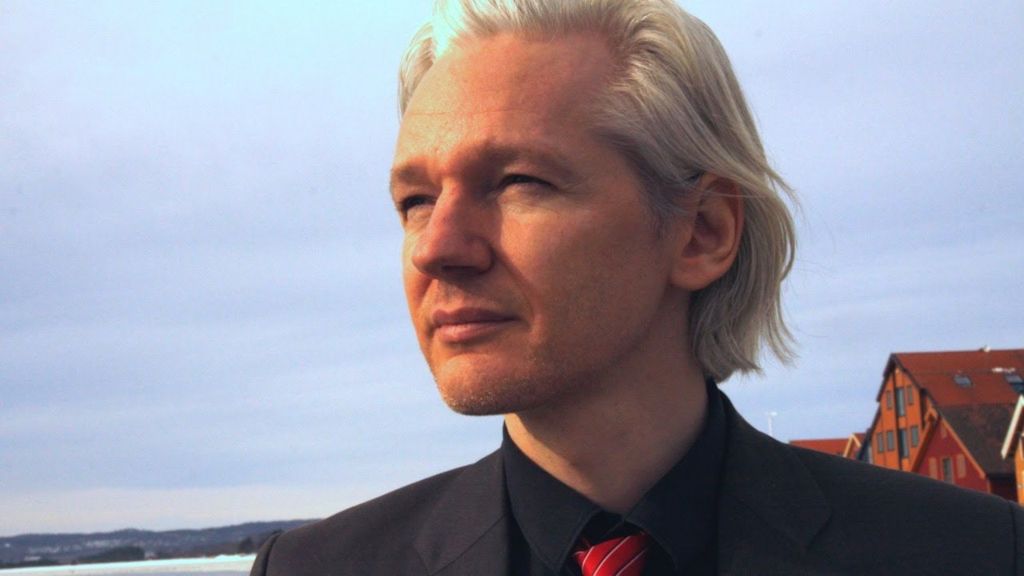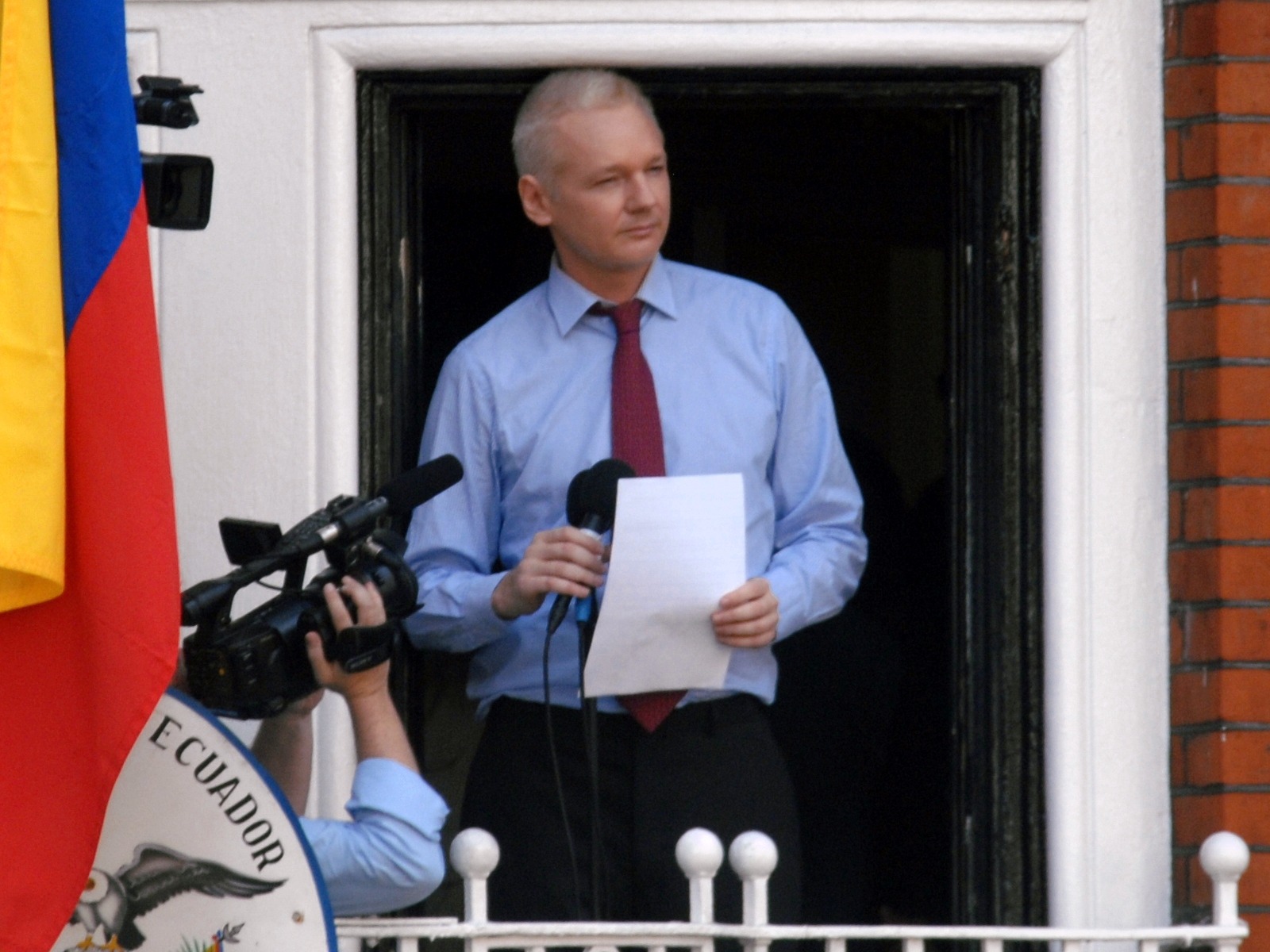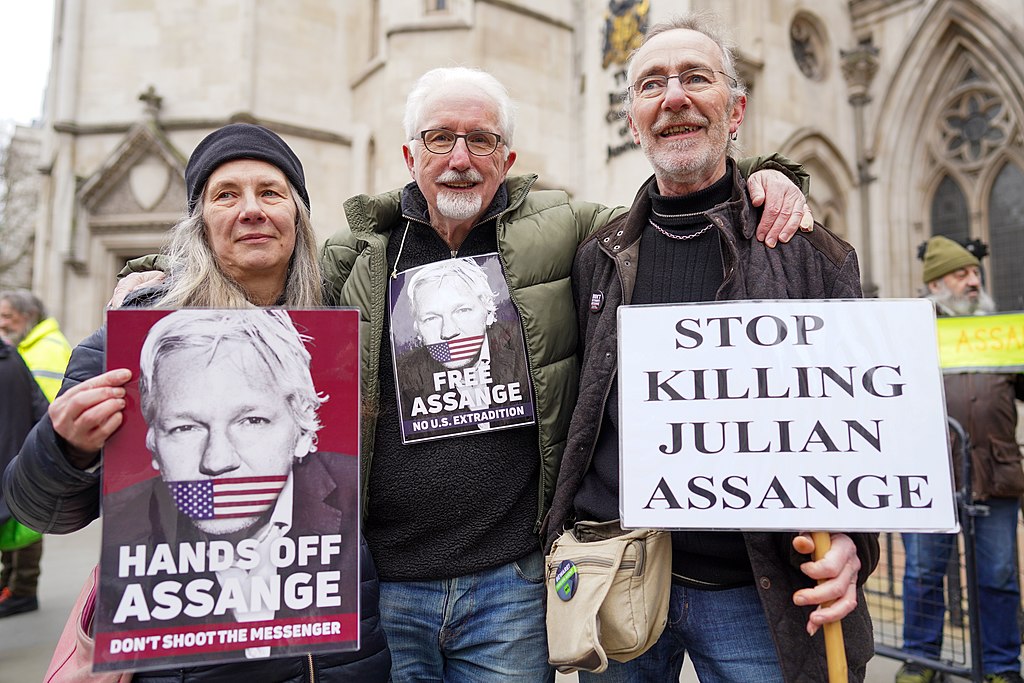In Defense of Julian Assange

By Thomas Lambert
Staff Writer
16/7/2022

Julian Assange (Picture Credit: laboratorio linux)
On 17th June, the British Home Office agreed to extradite Julian Assange to the United States. Assange has spent the 16 years since he founded WikiLeaks hounded, harassed, and slandered by government officials and the media; now, assuming his last-ditch appeal fails to halt the proceedings, he will soon be deported to face 18 felony charges which, combined, carry a maximum sentence of 175 years in prison.
At the very least, this decision represents something of a landmark in the history of Western journalism. It should galvanise not just all those who write or publish for a living, but all those who believe in the role of a free press in shedding light on the corridors of power. Yet despite the slew of independent inquiries that have found in Assange’s favor, public opinion remains curiously frosty towards him: according to YouGov, twice as many British people disapprove of him than approve – and the distaste is even more pronounced across the Atlantic in the Land of the Free.
Some of the resentment can be put down to good old-fashioned envy: not only does Assange do what every journalist should do, he does what every good citizen should do; he holds those with power over others to account – indeed, he has devised the 21st century’s most sophisticated ever mechanism for doing so. But most of the resentment results not from anything Assange has actually done, but from the coverage of it. In fact, the whole Assange story has become such a morass of lies, smears, and misapprehensions that other journalists have a duty to rectify it – if only to prevent it happening to them, a few years down the line.
Not only does Assange do what every journalist should do, he does what every good citizen should do; he holds those with power over others to account.
Smear 1: Assange is a hacker
It was, in all fairness, as a hacker that Julian Assange first made his name. He had always been fascinated by computers, and at the tail end of an unsettled, slightly bohemian childhood, he began to test the mainframes of various international organizations under the name “Mendax” (cribbed from Horace’s splendide mendax, “nobly lying”). In 1991, aged just 20, he was finally caught breaching the main terminal of a Canadian telecommunications company called Nortel, and arrested. Finding no malicious or mercenary intent, and making allowances for his disrupted upbringing, an Australian judge ordered him to pay reparations of $1,400, then released him on a good behavior bond. He has been convicted of no hacking offenses since.
Yet, people tend to think of Julian Assange not as a publisher or journalist, but as a hacker. WikiLeaks itself remains surrounded by suspicion, as though its staff were a cabal of cyber-terrorists – even though the website itself (unlike many major UK newspapers) has never actually been accused of hacking; it is, at its core, a news platform, begun in 2006, over 15 years after the young Assange had been accused of his last hacking-related crime.
This is the first thing people should bear in mind when pronouncing on the Assange case: whatever Julian Assange has been doing since 1991, he has been doing as a journalist. The secrecy that surrounds Wikileaks is necessary to prevent the site from being shut down and the identity of its sources revealed, not because hacking is integral to it. The deliberate attempt to blur these distinctions puts all other journalistic organizations at risk; it conflates those who report on leaks with those who perpetrate them, as if degrees of separation from wrongdoing were immaterial in the eyes of the law. And such a conflation, of course, serves those at the top. According to reports by Yahoo! News, intelligence officials are already busy lobbying the White House to introduce a new, murky, quasi-criminal category of “information brokers” to smear not just Assange and WikiLeaks, but other journalists who report on classified information, even if a third party has brought it into the public domain. The new category would effectively make it illegal for any journalist to publish classified information from any whistle-blower; it would, at a stroke, make the most distinguished investigative reporters we have unprintable. Julian Assange today, Glenn Greenwald and Lauren Poitras tomorrow.
Smear 2: Assange’s leaks were criminally negligent, and endangered people
The next great purported blot on Assange’s record came in 2010, when WikiLeaks published extensive war logs from the US invasions of Afghanistan and Iraq. Their contents amounted to the greatest journalistic scoop of the 21st century, an insight into the grubby workings of the deep state to rival the Pentagon Papers: thousands of hushed-up civilian casualties, litanies of human rights abuses, and crowning it all, a video dubbed “Collateral Murder” which showed American soldiers mowing down 18 civilians, including two Reuters reporters, with a helicopter-mounted machine gun.
The establishment backlash was swift and well-coordinated. Assange’s exposé may have been damning, but that didn’t alter that fact that it was, to many, irresponsible; perhaps, so the canard went, information that appeared to be in the public interest could be used by local militias to cross-reference, identify, and ultimately punish informers. The Obama administration quickly set about propagating this narrative. Joe Biden, then vice president, even went so far as to use the T-word: “I would argue it is closer to being a hi-tech terrorist than the Pentagon papers. But, look, this guy has done things that have damaged and put in jeopardy the lives and occupations of people in other parts of the world. He’s made it more difficult for us to conduct our business with our allies and our friends.”
Yet despite the conjecture, and despite the number of powerful institutions with a vested interest in proving such fears well-founded, there has been little evidence of the leaks leading to any actual reprisals. At any rate, it’s not like WikiLeaks just dumped the information indiscriminately: according to reports by The Guardian, it held 15,000 Afghanistan files back because they contained information that might threaten people, and the rest, according to Assange himself, were only published after the US military refused to assist the vetting process in an attempt to tie up WikiLeaks staff with endless paperwork. In fact, since the Afghanistan leaks, moreover, WikiLeaks has proved anything but reckless in its approach to the issue of source-identification, and has collaborated with mainstream media organizations to vet the data it receives and publish it in a more targeted way.
Smear 3: Assange is a rapist
In 2010, Assange sustained his most indelible accusation. On 20 August, two Swedish women accused him of sexual assault: the first, later identified as Anna Ardin, described having consensual sex with Assange, during which the condom they were using broke in such a way that led her to believe Assange had tampered with it; the second, referred to in the press as “Miss W,” alleged that, having falling asleep after a consensual sexual encounter, she later woke up to find Assange penetrating her without a condom. Though Ardin’s story provides no explanation as to why she believes the condom was interfered with rather than simply breaking of its own accord – and despite the clumsy interventions of Assange supporters like British politician George Galloway, who tried to explain the event away as “bad manners” – Miss W’s claim in particular remains deeply troubling, and deserves to be taken seriously, whatever Assange’s politics. A closer look, however, reveals a far more complicated state of affairs than most of Assange’s detractors would have the world believe.
After questioning Assange, Swedish authorities briefly dropped the preliminary investigation and permitted Assange to return to the UK. Two months later, however, the Swedish police issued an international arrest warrant: Assange gave himself up to British authorities; then, after a series of hearings determined that he was to be extradited back to Sweden, he famously sought asylum in the Ecuadorean embassy in London, where he was to remain for nearly seven years.
Among his critics, the narrative soon crystallized: Assange’s bail-skipping was incontrovertible evidence of his guilt, and proved the general malignity behind the WikiLeaks project. Yet important questions still remain unanswered, both by the Swedish authorities and the British Crown Prosecution Service. Why, for instance, did the CPS try so hard to convince the Swedish Director of Public Prosecution to continue the case when she tried to drop it for lack of evidence a second time in 2013? Why did Swedish prosecutors not review the international arrest warrant after it was condemned by the UN High Commissioner for Human Rights in 2016? Most importantly of all, why did the Swedish authorities refuse to pledge that they would not extradite Assange to the US if he returned to stand trial? Surely if the case were genuinely motivated by a desire to see justice done to Ardin and Miss W, then such a reassurance would be natural.
In any event, as UN special rapporteur Nils Melzer concluded after a lengthy investigation, Assange’s lawyers made over 30 offers to arrange for Assange to visit Sweden in exchange for a pledge that he would not be extradited to the United States. None of them were taken up. Not only had prosecutors “subjected [Assange] to nine years of a preliminary investigation for rape without charges being filed,” but they had actually changed one of the women’s statements without her involvement, in order to justify a more severe charge that would not be subject to the Swedish statute of limitations. The whole debacle amounted to an “abuse of judicial processes aimed at pushing a person into a position where he is unable to defend himself” – in other words, a smear campaign. For American authorities, the Swedish accusations really have engineered a win-win scenario: they ensure total character assassination if Assange refuses, and extradition if he complies. One day, of course, Assange ought to return to Sweden and, without threat of further extradition, face questioning over his alleged misconduct. But whether or not that happens is up to the Swedish (and American) authorities, not Assange.
Smear 4: Assange is a traitor
The first year of Assange’s confinement saw the US intelligence community racked by its most devastating leak yet. Edward Snowden, a contractor at the NSA, provided international journalists with around 10,000 documents proving that the United States government was monitoring its citizens’ private phone calls, emails, and even laptop webcams. Because of Snowden’s breach of official secrecy acts, legacy media was quick to brand him a traitor – and it wasn’t long before Assange began to be lumped in with him too, as part of a dark cabal of Western turncoats, determined to undermine the civilization to which they belonged.
Yet even if we sign up to this rather narrow ethics of allegiance, it is difficult to find Assange guilty. Unlike Snowden and Manning, Assange never signed official NDAs. He never worked for a US government organization. He had made no contract with the US authorities, and was under no obligation to respect official secrecy policies. In fact, the only way Assange could really be considered a traitor is if every individual in the world owes the CIA a primordial obligation of non-disclosure, US citizen or non-US citizen, at home or on foreign soil. No journalist should accept such an obligation.

Assange in the Ecuadorian Embassy in London, 2012 (Picture Credit: Snapperjack)
Smear 5: Assange was a bad house guest
Around 2018, after five years of effective imprisonment in the Ecuadorian embassy, Assange’s position began to look precarious. Lenin Moreno had taken over the presidency from his predecessor Rafael Correa, and within weeks of his inauguration, reports emerged from the ambassador’s residence of Assange’s “discourteous and aggressive behaviour,” not to mention “repeated violations to international conventions and daily-life protocols.” In the run-up to the final capitulation to the Metropolitan Police in 2019, the accounts grew even more graphic: faeces smeared on walls, skateboarding down corridors, and the installation of electronic signal-jamming equipment Ecuadorean officials had strictly forbidden. The sense of impropriety was only compounded by his marriage to Stella Morris, one of his attorneys. Assange, it seemed, was out of control.
The significance of such allegations should not be overstated. Even if we take them at their face, we must acknowledge not only the extenuating circumstances of a decade of imprisonment, but the fact that nowhere did the Ecuadoreans suggest that Assange had committed an actual crime. Yet, if we look closer at the circumstances surrounding Assange’s handover, we find a number of reasons to doubt the official story. Just a few weeks before Assange was finally handed over to British authorities, Moreno had accused WikiLeaks of publishing photos that linked him to a domestic corruption scandal; soon after, meanwhile, Ecuadorean Foreign Minister Guillaume Long alleged that Moreno had been promised a lucrative new IMF loan in return for his unruly captive – a claim certainly borne out by the IMF’s own press releases. We must, of course, allow for the possibility that Assange really was the terror Moreno alleges him to be. But we must also consider the reverse: that all the reports of stunts – the faeces-smearing, the skateboarding – were part of a co-ordinated press campaign to prepare the ground for a handover that was already decided, for the most cynical and mercenary of reasons.

Assange with the Ecuadorian Foreign Minister Ricardo Patino in London, 2013 (Picture Credit: Cancillería del Ecuador)
Smear 6: Assange is a Russian asset
From the moment Assange was arrested in the Ecuadorean embassy and taken to Belmarsh Prison, the process to extradite him was underway. It was around this time, too, that the tenor of the accusations against him began to change: suddenly, he was the accused of acting as the stooge for all kinds of hostile geopolitical actors, and in particular the Russians (a smear that is hinted at in official releases from the US Justice Department).
At the centre of the new allegations was the 2016 Democratic National Committee email leak. WikiLeaks had been fed the story by an anonymous source named “Guccifer 2.0” (in a nod, it seems, to “Guccifer,” a Romanian hacker imprisoned for breaching the Bush family’s email servers back in 2013). Since the story broke six years ago, the official state department line on Guccifer 2.0 has remained remarkably consistent, resurfacing once more in the Mueller Report of 2019: he or she is most likely an undercover hacker working for the branch of Russian intelligence known as the GRU. WikiLeaks’s most prized source since Bradley Manning, in other words, is a Russian spy.
Yet despite the remarkable way officials have closed ranks, they have produced almost no evidence to back up their allegations. The bulk of the suspicion seems to rest on the fact that Guccifer 2.0 used Russian, and particularly Moscow-based, servers – but so too, we must remember, did the original Guccifer, and he turned out to be an independent Romanian hacker who simply used Russian VPNs for their blend of speed and untraceability. Aside from the servers, the case seems to hang on one linguistic analysis of Guccifer’s messages to journalists that detects the influence of Russian syntax – interesting, to be sure, but hardly a smoking gun. Indeed, there’s about the same amount of evidence that Guccifer 2.0 is Russian as there is that he was the DNC staffer Seth Rich, mysteriously murdered exactly one month after Guccifer 2.0 was identified as the source of the leaks. This latter connection has been widely dismissed as a conspiracy theory.
But even if Guccifer 2.0 turned out to be a Russian – and even if he turned out to be a GRU spy – should it really be considered proof of Assange’s guilt? The idea is nonsensical. If Guccifer 2.0 really were a front for a hostile foreign government, then this would suggest that Assange didn’t suborn the hacking – that he is innocent, in other words, of the very espionage charges under which he is to be arraigned. After all, do we really think that the main factor inhibiting the GRU is a lack of a platform to publish what they find? The real question is this: should media outlets be barred from disseminating information that has been acquired illegally by third parties, if they believe it to be in the public interest? Any basic knowledge of the First Amendment to the United States Constitution suggests that this question can only be answered one way.
Smear 7: Assange is dodging a fair trial
Such is the prestige afforded to the United States Constitution and judiciary that, in the UK at least, there remains a widespread belief that Assange is dodging a fair trial. The US, so the story goes, isn’t China, or Russia, and still retains some semblance of rule of law; Assange’s reticence about extradition, therefore, is evidence of his guilt. The reality, of course, is very different. If Julian Assange really is extradited, he will find himself caught in the murkiest corners of the United States legal system – subject to legislation pushed through in times of crisis, when the First Amendment finds itself at the bottom of the list of national priorities. Julian Assange may be dodging many things, but a fair trial is not one of them.
If Assange really is extradited, he will find himself caught in the murkiest corners of the United States legal system.
Even if we disregard the US’ rich tradition of crooked judges, from the hearings of the Chicago Seven to the recent case of Steven Donziger, the fact remains that Assange will be tried under the 1917 Espionage Act – one of the most vicious, repressive, and arguably unconstitutional laws ever to sully the American statute books. The Act has its roots in Woodrow Wilson’s campaign to silence and imprison anti-war leaders like Eugene Debs and Joseph Franklin Rutherford, and contains several bizarre features that make mounting a strong defense almost impossible. First, it contains a “strict liability” provision – meaning that the defendant is considered guilty as soon as there is proof that they disclosed classified information, irrespective of intention and whether or not they knew the information was classified. Second, defendants are forbidden from using a “justification” defense – meaning they cannot argue that their leaks were morally necessary in order to expose official corruption and criminality.

Protestors opposing Assange’s extradition to the US in London (Picture Credit: Alisdare Hickson)
So far, the UK extradition hearings have focused almost solely on the physical and psychological harm that might befall Assange if he finds himself in a US federal prison: Assange is already a suicide risk, his lawyers argue, and if deported would find himself in “atrocious, solitary confinement conditions” that would almost certainly push him over the edge. But this line of reasoning has been chosen largely as a matter of expediency. The real argument against extradition is not the conditions under which the Americans plan to keep him, but the rotten statutes under which they have indicted him in the first place – but of course, to utter such a taboo in open court would only weaken the defense, and make Assange look more like the conspiracy theorist he is already accused of being.
***
One of the features of a smear campaign is that it does not work logically. It blends fact with hearsay, legal reasoning with moralizing, allegations of real-world harm with abstract misdemeanors. The desired effect is a kind of collage: none of the reasons are much on their own, but compiled together they appear devastating. Why bother reading the Espionage Act? Why trouble yourself with thousand-page UN reports? Julian Assange is just a bad guy, he’s weird and suspicious, and it’s high time someone put him in prison for good.
We must resist the psychological pull of this kind of thinking. Not only does it make us infinitely exploitable, it makes us turn on the few figures – like Julian Assange, like every journalist worth the name – who attempt to pull us out of our stupor.
